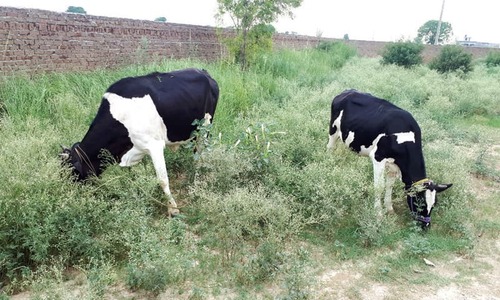The widespread growth of Parthenium weed is emerging in Pakistan as a major threat to the country’s food security, as well as human and animal health. It is estimated that the three major food crops — wheat, rice and maize — alone suffer yield losses of 16 per cent globally due to invasive weeds, costing approximately $96 billion annually. For a country like Pakistan, with 60pc of the economy dependent on agriculture, this issue is incredibly serious.
At first glance, a parthenium plant with tiny white flowers looks innocuous. Florists use this plant to fill, pack and enhance bouquets. In reality, however, it is one of the most noxious weeds that invades cropland, wasteland, lawns and public parks.
Several countries like India and Sri Lanka have introduced legislation to deal with the challenges posed by this weed — also known as “famine weed” — to their agro system and public health. Pakistan, too, has launched initiatives to combat this fast-spreading threat, but these efforts remain inadequate given the magnitude of the challenge.
Any strategy to manage the weed must focus on short to long-term actions. Short-term goals should focus exclusively on gathering evidence to generate awareness among key stakeholders, as well as prevent, detect, and control Parthenium.
Biocontrol agents may be the best way to deal with the noxious Parthenium weeds that threaten to damage Pakistan’s food crops
Medium-term goals will involve in-depth communication activities like mass extension campaigns, initiation of activities to import host-specific and damaging biological control agents and registering appropriate chemical herbicides for Parthenium control. Finally, long-term goals will focus on the development of an appropriate legal framework.
Dr Muhammad Anjum Ali, Directorate General Agriculture Extension Punjab, explains, “It has become a significant agricultural and environmental problem in Pakistan. Its rapid growth, allelopathic effects, and ability to displace native species have caused considerable damage to ecosystems and reduced crop yields.
“It’s become challenging for everyone and gone beyond the ambit of just the agriculture department or extension service. This is now a community pest, and it is possible to manage only with the mobilisation of the community.”
The weed called Gajar Booti in Pakistan entered the country from India in the 1980s and rapidly invaded rural and urban landscapes, affecting local habitats, harming agriculture and posing a big burden to farmers.
It now covers thousands of hectares of land, particularly in the rain-fed districts of northern Punjab, Khyber Pakhtunkhwa and Azad Kashmir, Balochistan’s Barkhan, Loralai and Musakhel districts and in Sindh’s Tandojam, Tando Allah Yar and Mirpur Khas districts.
The weed can reduce food crop (wheat, rice and maize) yields between 46pc and 90pc, thus posing a major threat to the farmers’ livelihoods and the nation’s food security.
The weed is poisonous to humans and cattle and can reduce wheat, rice and maize yields between 46pc and 90pc
This weed also has severe health effects on humans and livestock. It is poisonous, hosts malaria-carrying mosquitoes, and is highly allergenic. Its pollen can cause asthma, eye irritation, throat infections and eczema. In livestock, it causes mouth ulcers in animals that consume the weed.
“With no natural enemies to control it in its invasive range, it grows rapidly and displaces native plant species causing biodiversity loss,” says Abdul Rehman, Deputy Director of Projects Implementation and Research at the Centre for Agriculture and Bioscience International (CABI), a UK-based nonprofit inter-governmental organisation for scientific research, which is leading efforts to control this weed naturally in Pakistan since 2018.
Mr Rehman continues, “Farmers have traditionally relied on chemical pesticides; however, these can manage the weed only partially while posing grave risks to health and the environment.
“The other strategy is the introduction of biocontrol agents in some parts last year after extensive research and government approval. Invasive species like Parthenium invade new locations without their natural enemies. And this is a big problem. Without those beneficial plants and insects, the weed spreads out of control.”
Pakistan has made significant progress in implementing biocontrol programmes for the Parthenium, with the government showing commitment to supporting these initiatives. The stem-boring weevil (Listronotus Setosipennis) has been released in various regions, including Punjab, Sindh, Khyber Pakhtunkhwa, Balochistan and AJK, showing promise in controlling the weed’s growth and spread due to suitable climatic conditions.
However, Dr Babar Ehsan Bajwa, CABI’s Senior Regional Director, cautions that biocontrol is not a silver bullet. “It may take time for biocontrol agents to establish and have a significant impact on the weed population. In some cases, a combination of biocontrol, chemical control, and cultural practices may be necessary to effectively manage Parthenium.”
Furthermore, there is always a risk of non-target impacts on native plants or beneficial insects. Additionally, the success of biocontrol can be influenced by environmental factors such as temperature, humidity, and the presence of natural enemies of the biological control agent. Dr Bajwa is of the view that Pakistan should concentrate on a multi-biocontrol-agent approach. Therefore, CABI is focusing on the import of two new biocontrol agents.
Given its implications for the environment, agriculture, and human and cattle health, it is critical to tackle this invasive species. Therefore, the government must commit more resources and formulate an integrated policy to manage this invasive species.
Published in Dawn, The Business and Finance Weekly, October 28th, 2024













































Dear visitor, the comments section is undergoing an overhaul and will return soon.